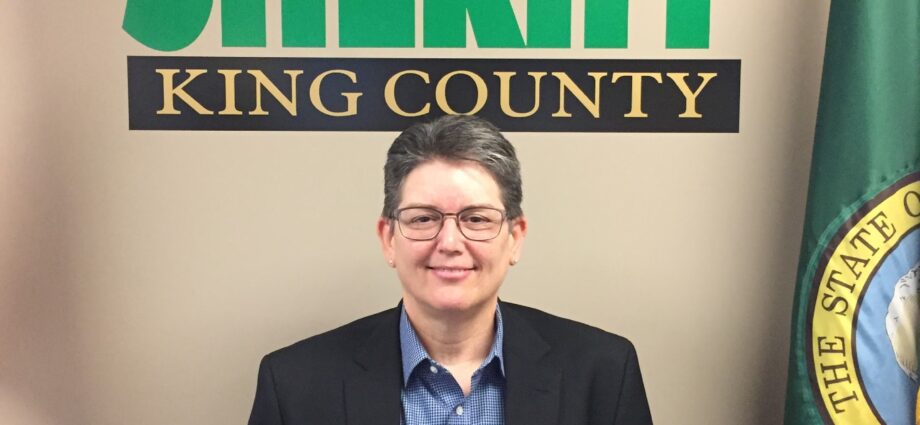By Jordan Duncan
New King County Sheriff Mitzi Johanknecht faces an uphill battle in trying to repair the image of the Sheriff’s Office.
But she’s used to challenges.
Just the second woman to be named King County Sheriff, and the first LGBTQ-identifying person to hold the office, the 30-plus year veteran of the Sheriff’s Office was not expected by many to unseat the incumbent John Urquhart.
“At the beginning, not a lot of people knew who Mitzi was — she was an unknown,” said her wife, Maureen Warren.
As new as her name might have been to some folks, many felt that change was absolutely necessary for the Sheriff’s Office.
The sexual assault allegations and criticism of the leadership of former sheriff John Urquhart left something of a black eye on the Sheriff’s Office. Johanknecht believes that the issues were born out of chronic and consistent miscommunication.
“I believe he felt he was communicating with the community,” Johanknecht said. “The problem was there was a breakdown in speaking within the Sheriff’s Office, sharing within, and communicating with the Sheriff’s Office.”
In speaking with union representatives, council members and other community leaders, she found a common flaw with the previous administration: decision making started and ended with Urquhart.
“It stopped at his level as to what our community engagement should be like,” Johanknecht said. “He went out and talked to the community. Within the organization there wasn’t any follow through in the communication.”
The first step is changing decision making into a methodical group effort within the Sheriff’s Office.
Scott Somers, King County Undersheriff and a long-time colleague of Johanknecht’s alluded to the clear-minded decision making process that she brings.
“She helps the slowing down — so that we can have clarity and thoughtfulness and wisdom in the direction that we take and the decisions that we make,” he said.
For Johanknecht, that means a structured plan involving input from all parties affected.
“We’re making all of our decisions focused through a plan that had community involvement in building it, people in the Sheriff’s Office building it, and people from the business community and government helping to formulate what the direction of the Sheriff’s Office should be,” Johanknecht said.
So far it has resulted in things like community advisory councils that help with strategic planning and making efforts to bring more people of color into law enforcement. While on the campaign trail she met with community leaders who had a similar vision but lacked the platform to put it into action.
“In speaking with the Vietnamese community, elders, they said, ‘We know what’s keeping Vietnamese young men and women from joining the Sheriff’s Office,’” Johanknecht said. “‘So if you come and listen to those and adapt your hiring processes around those, then you’ll be more successful.”
As the first lesbian sheriff in King County, she notes that while growing up, going through college and starting her career, she didn’t know whether she should be in the closet or not.
“To be able to be out in my career, and to be out running for office and not have any fear around that — it’s a pretty exciting time,” Johanknecht said.
It’s a responsibility that Johanknecht does not take lightly given the rhetoric of exclusion and discrimination from the President.
“Everything that is said and done [by President Trump] feels so against my own values and our own priorities here in the Seattle-King County area,” Johanknecht said.
Serving immigrants who may not have status and other underserved communities remains a priority of hers.
“To have a voice as an elected official, to stand up and stand out and stand against, that’s an opportunity that I won’t take for granted,” she said.
While in office, Johanknecht has met with members of the trans community to discuss trans crime, crimes against trans people and how detention centers deal with trans people.
“Experiences within our LGBTQ community, but still outside my personal experience, being informed about those kinds of things is really important to me,” Johanknecht said.
Undersheriff Somers says that Johanknecht’s capacity to care for others is a key trait.
“I am always amazed at the compassion she shows for people who are struggling or who are in distress,” Somers said. “She shows a degree of humanity that a lot of people don’t have.”
As if the three decades she spent in the Sheriff’s Office didn’t prepare her for the job, Warren says that her wife’s compassion, kindness and willingness to learn and listen make her a perfect fit. It’s a welcome change for a Sheriff’s Office that has received its share of criticism for not showing that willingness to listen in the past.
Warren once accompanied Johanknecht at an event held for women who were all running for some sort of office. Each woman had to come up with what they thought was their “superpower”.
“She goes, ‘What do you think? I don’t know what my superpower is,’” said Warren. “And I said, ‘Your superpower is your compassion. And your kindness. And you are willing to listen.”
Johanknecht’s father was a military policeman during the Korean War, which is how her interest in law enforcement began. But she didn’t pursue it until she was nudged by her softball coach in college, who was the first female field officer with the Washington State Department of Corrections.
Six months after going on a ride-along with a friend who was already working at the King County Sheriff’s Office, Johanknecht was in the police academy.
Some of her most memorable moments happened around 1991, she said, when Johanknecht became the public housing deputy for South King County. It was while working with underprivileged children when she began to realize what her impact was.
She was an on-site cop for five days a week, eight to 10 hours a day. But she was also given the opportunity to work with the youth, taking them to the circus and chaperoning on camping trips, and she saw firsthand how powerful a positive police presence can be.
“It involved spending time with kids, which I love, but also the awe when some kids who lived down in the Kent area, when we went to downtown Seattle for an event, as they came around the corner and saw downtown Seattle for the first time,” Johanknecht said.
“The lack of their ability to be able to experience some things that I was able to as a young kid — to understand how lucky I was — kind of changed how I was as a cop, too. It was probably one of the earlier times of recognizing privilege,” she said.
It is this sort of community outreach that Johanknecht hopes will become the hallmark of the King County Sheriff’s Office.
“I know that it takes a heart of service to do certain kinds of work,” she said. “I know that the people at the Sheriff’s Office have that heart of service. Now we just have to be better at sharing our heart.”
King County Sheriff Mitzi Johanknect wants to adapt policing to the needs of the community. As a supporter of De-Escalate Washington’s I-940, for her that includes expanding the use of less lethal tactics. She describes those goals here.

